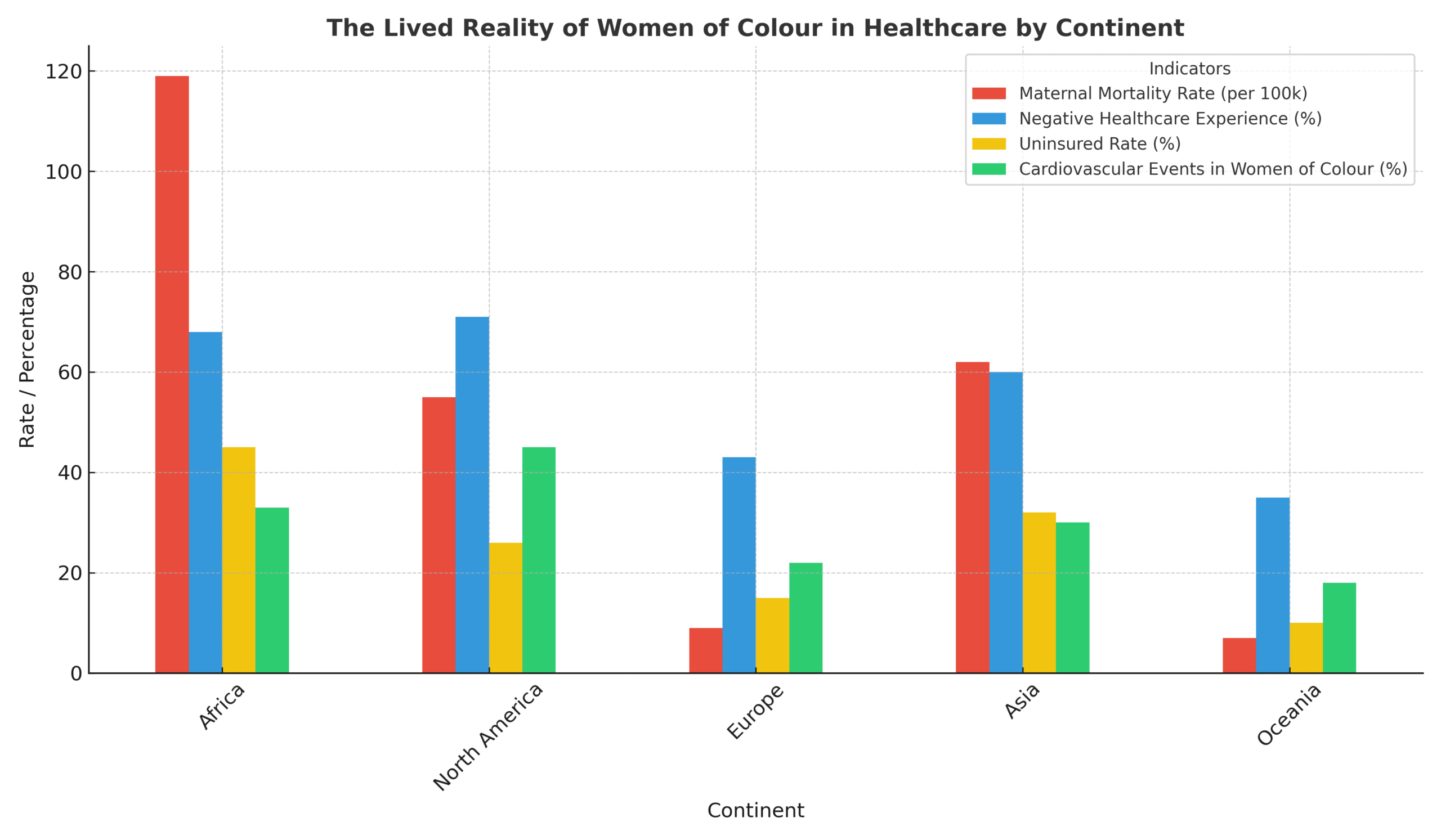International Day of Action for Women’s Health
The Real Cost of Delay in Women’s Health: A Call for Urgency on the International Day of Action for Women’s Health
On this International Day of Action for Women’s Health, we are not here to repeat statistics or present abstract charts. Today, we are here to confront the lived reality of women’s health, particularly the women of colour who suffer disproportionate harm due to systemic delays. We’re here to acknowledge that the cost of delay isn’t just an inconvenience; for too many, it is a matter of life and death. We’re here to confront this injustice head-on, and we ask: How much longer can we allow this to continue?
A System That Doesn’t Listen: The Real Price of Delay

Women’s health isn’t just about reproductive health or access to contraception. It’s about human dignity. It’s about lives lived, lives lost, and lives left behind by a system that fails to act swiftly when the need is most pressing. Health systems are not just delayed by paperwork or scheduling issues, they are delayed by deep-seated inequalities, by years of neglect, by institutional racism, and by the failure to recognize the lived experiences of women, especially women of colour.
We all know the stories, and yet, for some reason, they continue to go unheard:
👧🏾 Age 13: A young girl in school, experiencing her first period. She asks for a simple piece of tissue to manage her bleeding. She is laughed at. No one explains the natural biological process, leaving her confused and ashamed.
👩🏽 Age 19: A young woman seeking contraception, desperate to take control of her reproductive health. She is dismissed with condescending advice to “pray” and “behave,” leaving her vulnerable to unwanted pregnancy, while her health concerns are disregarded.
🤰🏿 Age 24: A pregnant woman living in a rural area with no nearby clinic. She pleads for care but is turned away and told to come back later. Tragically, she nearly dies during childbirth, a fate far too common for women of colour in underserved communities.
These are not isolated incidents. These are the direct results of a healthcare system that fails to respond quickly and effectively to the needs of women, especially those who are marginalized. These women do not have the luxury of delayed care. Their health, their dignity, and their very lives are at stake.

The Lived Reality of Women of Colour in Healthcare
The harsh truth is that, for women of colour, the barriers to healthcare are even greater. These women face an uphill battle not only because of the limitations of their local health systems but also because of the racial and gendered biases that permeate these systems. It is a truth that is too often denied, but it’s undeniable when we look at the facts.
Women of colour are disproportionately affected by poor health outcomes:
Women of colour are 2 to 4 times more likely to die during childbirth compared to their white counterparts.
Their pain is often dismissed or minimized by healthcare professionals, leading to delayed diagnosis and inadequate treatment.
Their health needs are under-researched, with little to no focus on the specific challenges they face in accessing care or receiving culturally competent healthcare.
This is not a coincidence. This is the result of a healthcare system that has failed to account for the realities faced by women of colour, one that has failed to respond to their needs with the urgency and seriousness that those needs demand.
When Women of Colour Speak, Health Systems Must Listen
Women of colour are often dismissed when they speak about their pain, fears, and experiences. It’s not just in the medical setting, it’s in the streets, in the workplace, and even in their own homes. Just last month, we saw yet another femicide in Mexico, where a woman who reported harassment was ignored and, tragically, later found murdered. This is not an isolated case. The dismissal of women’s cries for help happens far too often, and not only in cases of violence.
We see this same neglect in health systems worldwide. The routine dismissal of women of colour’s health concerns is one of the greatest injustices we face. Women of colour report that their symptoms are not taken seriously, their pain is not validated, and their needs are overlooked by health professionals. They are often not believed when they speak about their symptoms, and their pain is disregarded as being less urgent than that of others.
This isn’t just a case of a few bad actors in the system, it’s a systemic problem. It’s a reflection of broader societal inequalities. It’s the failure of the system to adapt to the needs of diverse populations. The truth is painful, but it’s necessary: for many women of colour, healthcare is a luxury they simply cannot afford.
Why Does This Delay Happen?
The causes of these delays are complex. They lie in a combination of factors, some institutional, some cultural, and some based in prejudice.
Institutional Barriers: In many parts of the world, particularly in low-income regions, healthcare systems are underfunded and understaffed. This results in long waiting times, lack of essential medical supplies, and, ultimately, the failure to respond promptly to health emergencies. Women, particularly those from marginalized communities, often bear the brunt of these failings.
Cultural Barriers: Many health systems are not culturally competent. Healthcare providers may not understand the specific needs and experiences of women of colour, and this lack of understanding can lead to mistreatment, misdiagnosis, or neglect.
Racial and Gender Bias: Implicit bias plays a significant role in the care women of colour receive. Studies have shown that healthcare professionals are more likely to dismiss or downplay the health concerns of women of colour, especially when those concerns are related to pain, reproductive health, or chronic conditions.
A Call for Urgent Action
The cost of delay is far too high. Women are paying the price with their lives, with their health, and with their futures. But it doesn’t have to be this way. We have the power to change the system. We have the responsibility to act. The first step is recognizing the problem and then committing to urgent, systemic change.
At PBHI, we are committed to:
Culturally competent, gender-informed healthcare: We believe that healthcare must be tailored to the unique needs of women of colour, respecting their cultural identities and lived experiences.
Research that reflects real people, not just test subjects: We are committed to funding and promoting research that addresses the specific health challenges faced by women of colour, ensuring that their needs are represented in the scientific community.
Policies that act with urgency, not performative concern: We are calling for policies that prioritize women of colour’s health, not just in theory, but in practice. These policies must be designed to address the structural inequalities that perpetuate poor health outcomes for women of colour.
What You Can Do: Steps Towards Change
This is a call to action. We cannot wait for change to come from the top down. We must push for it, demand it, and act at every level. Here’s what you can do to help create a system where women of colour are heard, respected, and given the care they need:
Listen and Believe Women, The First Time
Don’t dismiss their pain or concerns. Listen when they speak about their health. Believe their stories and validate their experiences. This isn’t just about being kind; it’s about being effective in delivering care.
Fund Research Led By and For Women of Colour
The medical field must prioritize research that focuses on the unique health needs of women of colour. We need more studies, more funding, and more research that reflects the realities of their lives.
Show Up in Policy, Partnership, and Practice
Advocate for policies that prioritize the health of women of colour. This means holding governments accountable, demanding healthcare reforms, and working with organizations that are committed to systemic change.
Don’t Wait for Systems to Shift, Push Them
Change won’t come on its own. We must push for it. We must demand that health systems respond to the needs of women of colour. Push for faster care, better research, and more inclusive policies.
The Future We Want: A Call for Global Health Equity
The future we want is one where women of colour’s health is prioritized, where their pain is taken seriously, and where their needs are met with urgency and care. The future we want is one where no woman is dismissed, where no woman is ignored, and where every woman has access to the care she deserves.
We invite you to join us in this fight. Partner with us to create a world where women are heard, respected, and healed. Together, we can build a healthcare system that works for all women, especially those who have been left behind for far too long.




Leave A Comment